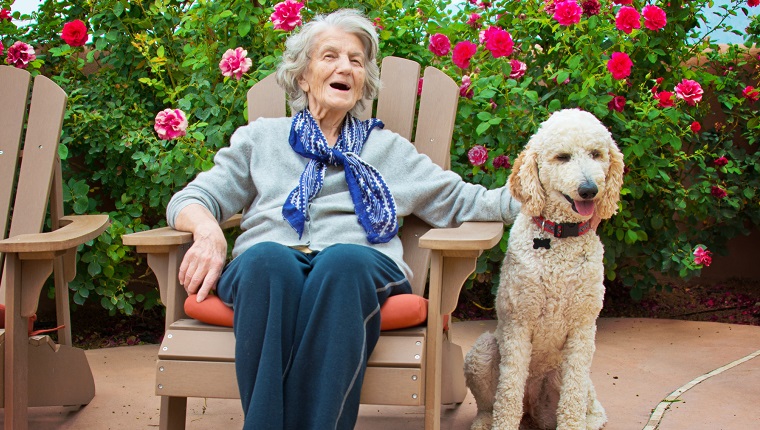Therapy dogs offer more than just assistance and companionship to patients and people in need. Once a month, visitors of the Alzheimer’s Foundation of America‘s (AFA) Education and Resource Center get to bond with therapy dogs for a free session.
Individuals who have Alzheimer’s or other dementia-related illnesses take part in the hosted bonding sessions with therapy dogs. Family members or caregivers who are with the patients can also enjoy the experience.
“We’re an organization of pet lovers, and we recognize the therapeutic value animals hold for individuals of all ages,” said AFAdirector Molly Fogel in an interview with People. “Specifically when it comes to dementia-related illnesses, there is a variety of ways pet therapy has value.”
When Dogs Bring Out People’s Affectionate Side
As dog lovers, we know how easily our pups draw out positive reactions and emotions from us. In the case of therapy dogs, people in a nursing home environment also tend to experience more emotional pulls when a dog is present.
At AFA, the staff have already experienced instances wherein participants instantly engage with therapy dogs. They experience positive emotions that stimulate memories of warmth and care that help them stay connected.
The Good Dog Foundation partners with AFA by having two of their trained therapy dogs in the center each month. The dogs both trained specifically to engage with senior citizens. AFA reserves 15 slots for the free therapy sessions, as this ensures quality time between participant and therapy dog.
“Once you see them with the dogs, it is just smiles and joy and stories and laughter. They become almost transformed and leave with smiles on their faces excited to come back,” said Fogel. The benefits of these monthly interactions are invaluable, proof that even Alzheimer’s cannot take away people’s abilities to engage with others and dogs through warm gestures.
How Dogs Help Assist Patients With Dementia
Offering canine assistance for Alzheimer’s patients is not a new concept. While it has not become a widely-adapted practice among nursing homes, having what are called “dementia dogs” brings benefits to patients.
Some programs like the Dementia Dog Project aim to train dogs who will help patients with dementia-related issues. This is similar to the way service dogs are able to help medically assist their owners.
Perhaps the idea of companionship greatly benefits those who are able to enjoy the company of a dementia dog. Something as simple as interactions with dogs can greatly change the mood of a person suffering from dementia and bring them the kind of engagement that can greatly influence their well-being.
What do you think of dementia dogs? What other benefits do you think therapy dogs with dementia-related training can bring to patients? Let us know your thoughts below!
Related Articles:
Not Just Tools: Service Dogs Give Owners More Than Physical Care
Dog’s Sense Of Smell Saves Life Of Teenager Allergic to Everything









